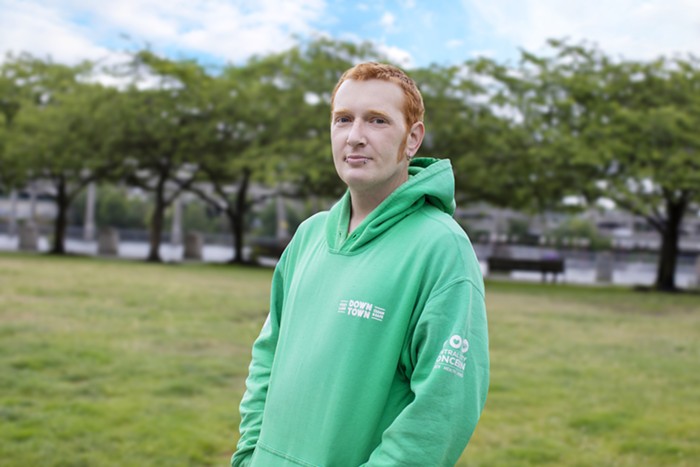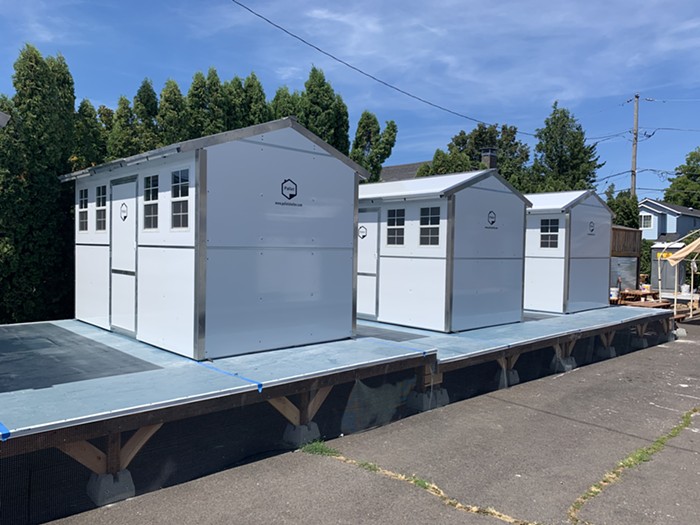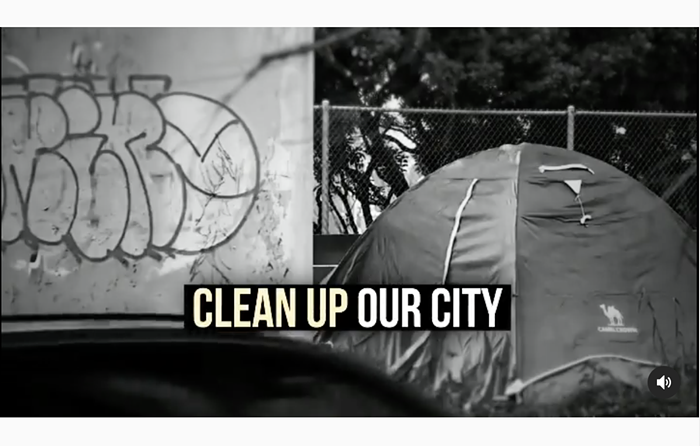Feature your business, services, products, events & news. Submit Website.
Breaking Top Featured Content:
Funds From Metro’s New Supportive Housing Service Tax Reach Portland’s Homeless


After seven years living on Portland sidewalks, Anthony Hurt was ready for a change. It was 2019—nine years after his 2-year-old daughter’s death sent his life spiraling into a fog of depression, addiction, and homelessness—and the 36-year-old had reached a breaking point.
“I was tired of waking up cold and wet and not knowing if my things would get stolen if I left them anywhere,” said Hurt. “It was too hard.”
Hurt checked himself into Hooper Detoxification Stabilization Center, a detox program run by Central City Concern (CCC). It wasn’t his first time there—his addiction to heroin had brought him to Hooper in the past. But this time was different, for two reasons: Hurt finally felt committed to stop using heroin, and CCC had an opening in one of their residential inpatient treatment programs. Hurt was transferred to Blackburn Center, a CCC-run housing facility in East Portland that comes with wrap-around services for people in recovery, offering everything from mental health care to medication management to support group meetings under the same roof. The facility even offered acupuncture to its residents to reduce chronic pain, stress, or substance cravings.
“Everything is provided in the building,” said Hurt. “All the tools you need to improve your life.”
After six months in the Blackburn detox program, Hurt graduated from a dorm-style apartment to his own studio in the building. Staff helped him get a job at CCC with a program called Clean Start, where Hurt picks up trash and removes graffiti in downtown Portland. He’s now been clean from using heroin for two years, and when he comes home to his apartment in the evenings, Hurt says he’s “comfortable and happy.”
Hurt knows his story could have ended differently. If he was just given an apartment after living on the streets without any of the services offered by Blackburn Center, Hurt said it would have only worsened his health.
“It would just put a bandage on the problem, I would have no reason to quit using [heroin],” said Hurt. “There’s no accountability… there’s no one looking out for you. You need that support to better your life.”
Programs like Blackburn Center’s addiction recovery program fall under the definition of “supportive housing”—an umbrella term for programs that help homeless people move into housing and maintain that housing with the help of free on-site social services, ranging from detox programs to medical care to child care. It’s these programs that Portlanders threw their support behind in May 2020, when they voted to approve an income tax to fund supportive housing services to address chronic homelessness across the metro region. Now, after its first tax collection cycle, the money is finally reaching those programs.
“This is one of the most important streams of funding services for housing stability in the country. The opportunity is unparalleled.”
As Portland enters its 19th month living with the COVID-19 pandemic, public outrage over Portland’s homeless crisis is at a boiling point. Remote work has stripped downtown Portland of its normal foot traffic, allowing tents to occupy once-busy sidewalks, and the city’s narrowed criteria for camp sweeps have allowed many of them to remain. A well-funded campaign is using sinister black-and-white images of homeless encampments to encourage support for expanding the city’s police force, and many progressive Portlanders who marched in 2020 to dismantle policing are warming to the idea. City Hall is under pressure from downtown businesses and property owners to clear blocks of homeless campers. Many in power have raised concerns in public meetings that the promises of the supportive housing services measure won’t be realized fast enough.
Yet, as politicians and business leaders push for an accelerated solution to the city’s long-brewing homeless crisis, advocacy groups and service providers are turning to proven (and voter-endorsed) solutions to chronic homelessness with a rare influx of funding. If distributed effectively, the new revenue has the potential to jumpstart the slow-moving solutions for people living on Portland streets.
“I look at the [supportive housing services] measure as one of the most important streams of funding services for housing stability in the country,” said Marisa Zapata, the director of Portland State University’s Homelessness Research and Action Collaborative. “The opportunity is unparalleled.”

The May 2020 ballot measure isn’t the first time Portland-area voters approved new taxes to help those struggling to secure housing.
In 2016, Portlanders passed a $258 million affordable housing bond to construct 1,300 units of housing affordable for low-income tenants. (As of April 2021, only 314 of those units have been built.) In 2018, Metro proposed a similar bond to encompass all three counties the regional government oversees. The $653 million bond promised 3,900 affordable housing units across the region. (As of September 2021, 64 of those units have been constructed.)
These proposals were in line with a “housing first” response to homelessness—the idea that, once someone has a permanent place to call home, the other challenges in their life can be addressed. At the same time, it’s often difficult for longtime unhoused individuals to seamlessly transition into housing if they have other unmet needs, like substance abuse disorder, a disability, or mental illness. That’s why, in 2019, homeless advocates launched a campaign around creating a supportive housing services ballot measure to supplement those housing bonds.
“The affordable housing bonds needed to be paired with permanent supportive housing in order to help someone be successful moving from homelessness to housing,” said Angela Martin, director of Here Together, the organization behind the campaign to get the supportive services measure on the 2020 ballot. “Bonds can only be spent on infrastructure. The supporting housing services measure can be spent on services. The two together are what can help people end their homelessness.”
The ballot measure proposed placing a 1 percent tax on high-income households in Multnomah, Clackamas, and Washington counties in order to collect about $248 million per year to go directly towards supportive housing services. It passed with 58 percent of voters’ support. Metro oversees and distributes the new fund throughout the region. The first installment of those funds were collected this year, and reached counties by mid-summer. Multnomah County received $52.1 million.
Martin and others with Here Together have spent the past year helping each county cobble together a proposal for how it intends to equitably distribute the funding.
In Multnomah County, the funds have been distributed by the Joint Office of Homeless Services (JOHS), the department shared by Multnomah County and the City of Portland.
The tax measure requires that 20 percent of county revenue be used for short-term, immediate programs. In Multnomah County, that means helping people currently living in shelters secure permanent housing, putting investments in additional shelters, and offering rent assistance to people at risk of homelessness.
The other funds are divided among a variety of programs, all geared toward assisting homeless people secure permanent housing, whether that’s handing over a rent check or providing someone with support services tailored to their needs. One program promises to move 200 older individuals with underlying health conditions out of a JOHS shelter and into permanent housing with wrap-around support services. Another will fund permanent supportive housing for up to 100 homeless people who have a severe mental illness.
“Some people don’t exactly know what help they need. It’s on us to build a relationship with a person in order to find out what their needs are.”
Nearly $2 million will go towards expanding JOHS’ outreach teams, including the Navigation Team, a program that contracts with Transition Projects and CCC to send trained outreach staff to different homeless encampments and offer to connect people with social services. Ieiesha Bolian has been with the Navigation Team since its inception, just over two years ago, and said her workday can be spent meeting a wide variety of needs.
“It’s helping people get into drug or alcohol treatment, it’s getting them new IDs, it’s getting them health care, it’s connecting them with service providers they lost touch with, it’s housing placement, it’s having genuine conversations with people about what could make their life a little easier,” said Bolian.
The small teams are usually dispatched by the city’s Homelessness/Urban Camping Impact Reduction Program (HUCIRP), which receives reports from the public identifying areas with high-density campsites. The idea is for the team to help meet campers’ individual needs in order to eventually relocate them and clear the encampment. That kind of assistance isn’t something that can be forced on a person, Bolian said.
“A lot of it is understanding where people are at or what happened to them to be where they’re at now,” said Bolian. “Some people don’t exactly know what help they need. It’s on us to build a relationship with a person in order to find out what their needs are. It’s not anything that happens overnight. Sometimes it takes a while—months—to get that trust built.”
Bolian said not everyone living outside is eager to move into housing. For people who’ve lived outdoors for years, a life behind a closed door carries a lot of fear, she said.
“I remember we helped get a guy into an apartment, and he slept in his tent on the balcony for the first few days,” said Bolian. “It’s all about meeting people where they’re at.”
COVID has increased demand for Bolian’s team across the region. She said the extra funds from the supportive housing services measure will go toward hiring new outreach staff to expand their impact.
For Rachel Eddy, a behavioral health manager at Outside In, the new funding stream means moving at least nine homeless youth with behavioral health needs into permanent housing. Eddy helps run Outside In’s Assertive Community Treatment (ACT) program through a contract with Multnomah County. ACT works with 50 young adults without reliable housing that have a mental illness or substance abuse disorder. Staff on the ACT team are regularly out in the community checking in on their clients, whether that means visiting a tent or a shelter. Eddy said a priority for their clients is getting them into stable housing.
“Housing intervention is game changing, in terms of everything,” said Eddy. “A lot of people are living in situations that are unsafe for them. Living outside, especially with a mental illness, you’re always in survival mode. Having a home allows people to relax, and feel more secure.”
It’s challenging to get substance abuse treatment or remember to take medication while living outside, turning housing into a health necessity for ACT’s clients.
“It’s a sense of relief to know that someone who’s been waiting for months for a place to live can finally get that stability,” Eddy said. “Sometimes, it’s that period where we’re waiting to get them in housing that we lose touch.”
The supportive housing funds will cover nine housing vouchers for their clients, allowing people to move into a residence of their choosing—as vouchers can be used for any market-rate rentals.

Not all organizations funded by the new measure have a long history working with JOHS.
In 2020, a collaboration between Sunnyside Neighborhood Association and volunteer homeless services group Beacon PDX turned into Beacon Village, a collection of outdoor shelters for homeless Portlanders located in the parking lot of Bridgeport United Church of Christ in Northeast Portland. The program wouldn’t have gotten off the ground without funding from JOHS, which put out a public call for alternative shelter models last year. According to JOHS, the supportive housing services dollars will cover about $1 million to get Beacon Village up and running this year. Beacon Village acting director Matt Lembo said that covers about 85 percent of the village’s operating costs.
“We couldn’t have done this without that funding,” said Lembo.
Beacon Village consists of 10 standalone shelters furnished with heating and electricity, an on-site laundry, shower, and bathroom facilities. The church offered the village their lot to use, and have also made the church’s industrial kitchen available for village residents. Members of the church will volunteer with Beacon Village to support tenants, whether that’s driving them to appointments or helping them apply for permanent housing. Lembo said the church’s partnership is crucial to the village’s success.
“Building a village like this next to a functioning community— that’s the special element,” he said. “That’s what makes it a supportive program.”
Pat Schwiebert, who sits on Beacon Village’s board, has plans to use the church’s kitchen to lead a work training program for villagers. The idea: teach residents how to prepare meals to serve to other unhoused Portlanders in the neighborhood.
“That will give them training in a kitchen, and an ability to feel like they’re part of this community,” said Schwiebert, who previously led a free meal program known as Hard Times Supper at the Sunnyside Methodist Church.
Like other villages funded by JOHS, Beacon Village is meant to be a stepping stone for folks making the transition from homelessness and permanent housing. But tenancy doesn’t come with a time limit, Lembo said.
“The reality is, there just isn’t enough housing available right now,” said Lembo. “Beacon Village can fill that need in the meantime. But with this funding, I think we’re turning the corner on the issue.”
Lembo, a Sunnyside Neighborhood Association member who left a desk job to help start Beacon Village, said it’s on community organizations of all sizes to address the city’s homelessness crisis.
“I always hear, ‘What’s the city going to do about homelessness?’” said Lembo. “People need to realize we’re the city in this situation. At the end of the day, a big old funnel of money is pointed at community groups, and it’s on us to come up with solutions. If we just think ‘Oh, that ballot measure passed so the problem is taken care of,’ we’re going to wake up to a much worse problem down the road.”
““The reality is, there just isn’t enough housing available right now. But with this funding, I think we’re turning the corner on the issue.”
Zapata, with PSU’s Homelessness Research and Action Collaborative, said she’s hopeful about where the first allocation of supportive housing services (or, “SHS”) funds are being distributed. But, she cautions against steering much of the revenue toward programs that don’t put people into permanent housing.
“Look, you can put SHS toward well-designed villages,” said Zapata. “But the question is: How much do we spend on something that supports just a small number of people? Every dollar that we take away to spend on villages is taken away from support services. This is all about tradeoffs.”
The supportive services funds are fueling only a portion of the Portland area’s response to homelessness. The new dollars are reaching providers as Portland City Council rolls out a new plan to create six outdoor shelters, dubbed “Safe Rest Villages,” for people living outside and as the city’s housing bureau unveils plans to open new affordable apartments funded by the Metro affordable housing bonds.
Yet Denis Theraiult, a spokesperson for the JOHS, said that supportive housing services funding is more than just a piece of the region’s response to homelessness.
“It’s not about how and whether the [supportive housing services funds] fits in with the region’s response,” wrote Theriault in an email to the Mercury. “It’s really more that this is the regional response to homelessness. This is the first time that there’s both funding and a structure to develop a regional response to a crisis that has been regional for a longtime.”
Theriault sees the funding being able to “relieve the bottleneck” in how the entire metro area addresses the crisis of homelessness.
Not everyone is convinced.
In August, an organization called People for Portland entered the Portland political sphere, unleashing an army of compelling TV ads slow-panning over images of homeless encampments and graffiti. The ads call on the public to “tell the politicians to do their job” to “save the city we love” by cleaning up trash, expanding the local police force, and moving homeless people into shelters. The anonymously funded group isn’t rallying support for a specific ballot measure or campaign—it’s simply urging people who are upset about homelessness and crime to contact City Hall about it.
Although the campaign does not disclose its donors, several wealthy business owners and developers in Portland—namely, Tim Boyle and Jordan Schnitzer—have expressed their support of the campaign.

People for Portland boasts its bipartisan perspective, as it’s co-led by by Dan Lavey, a political consultant for Republican candidates and conservative measures, and Kevin Looper, a longtime consultant for Democrat candidates. Looper has argued that the city isn’t doing enough, quickly enough, to address homelessness and housing instability.
“Long term planning is critical,” Looper told the Mercury in September. “And it’s hard and it takes time, and I know that. I don’t think people who look out the window and see homeless people lining the sidewalks know that. We need to treat this like the crisis it is.”
Looper’s argument rings hollow for some, due to his previous job: running the campaign for the 2020 supportive housing services measure. Looper and Martin were the architects of the measure, convinced that a tax to fund supportive services would accelerate the region’s ability to resolve its homeless crisis.
Then the measure passed.
“The environment has changed since we passed that measure,” said Looper. “It turned from a quickly moving solution into a culture of having many bureaucratic meetings and moving very slowly. But I don’t feel like my values have changed at all around this.”
Looper is especially critical of the JOHS’ role in selecting which service providers are rewarded funds, and has concerns that the promise of funding forces organizations to “go along to get along” with the program’s slow timeline. He’s pushed an argument touted by local developers that social service providers who sit on JOHS boards are unfairly taking advantage of taxpayer dollars to support their causes.
It’s true that most of the funding this year went to organizations and programs that already had contracts to do work with JOHS. According to JOHS, this allowed the funding to get out the door swiftly, since these organizations had already been vetted by the office—and had gone through the often drawn-out contract negotiating process. Moving forward, JOHS intends on helping newer organizations receive those funds.
“We are developing mechanisms to help our new providers muster the financial resources to launch new programming, while also creating contracts with technical assistance providers who can help these new organizations with their organizational capacity needs,” wrote Theriault. “We expect these new providers to be in place to begin taking on more services in Multnomah County and the region starting in year 2 of the measure.”
Katrina Holland, director of JOIN, one of the homeless nonprofits benefiting from the supportive services fund, calls the People for Portland campaign “callusing.”
“It’s a cop out,” said Holland. “The houseless crisis that we see today is decades in the making. It’s an externality of a failed housing system. To put the blame on the people and programs at the very end of this system—it’s just cowardly.”
“Despite what people want to hear, there is no miracle cure to chronic homelessness.”
Holland, who sits on the Here Together board, said that if Portland’s deep-pocketed business leaders and political consultants truly wanted to improve the state of homelessness they could also look at how their own industry contributes to the crisis.
“If we paid people living wages, we’d have less people on the street,” Holland said. “If we talked about the realities of an unchecked rental housing system that, for a long time, had unlimited rent increases and allowed people to be evicted for absolutely no reason, we’d have less people on the street. If we addressed the lack of mental health resources in this state, we’d have less people with behavioral health issues on the streets.”
JOIN will be using its allocation of supportive housing service funds to cover housing costs for formerly incarcerated people at risk of being homeless. The program won’t just work to find landlords open to renting to a tenant with a criminal history, but help their client connect with job opportunities to create long-term stability.
Holland said she’s hopeful that the new revenue is going to create a lasting impact on the area’s housing instability. But she’s certain it won’t solve the key issues that contribute to homelessness.
“These dollars will make a dent, but it is unlikely that it will solve the problem. A wide spectrum of need requires a wide spectrum of support,” said Holland. “Despite what people want to hear, there is no miracle cure to chronic homelessness.”
Continue Reading at PortlandMercury.com here
